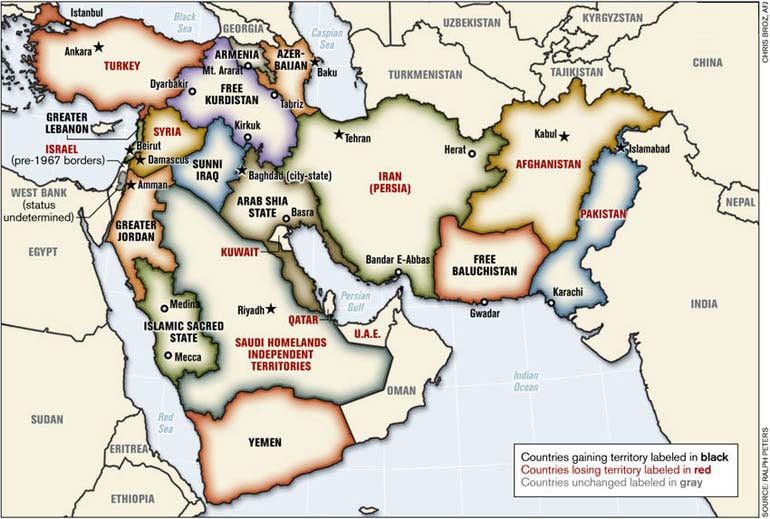The Secret Wars of the Saudi-Israeli Alliance
May 29, 2011 3 Comments
By Mahdi Darius Nazemroaya
Global Research
May 29, 2011
As an old Chinese proverb says, crisis can be used as an opportunity by some.
Tel Aviv, Washington and NATO are taking advantage of the upheavals in the Arab World. Not only are they fighting against the legitimate aspirations of the Arab people, they are manipulating the Arab geo-political landscape as part of their strategy to control Eurasia.
Sectarian Conflicts in Egypt: A Means to Weaken the Egyptian State
Egypt is ruled by a counter-revolutionary military junta. Despite the increasing assertiveness of the Egyptian people, the old regime is still in place. Yet, its foundations are becoming shakier as the Egyptian people become more radical in their demands.
Like in the Mubarak era, the military regime in Cairo is also allowing sectarianism to spread in Egypt in an effort to create divisions within Egyptian society. In early-2011 when Egyptians stormed government buildings they discovered secret papers that showed that the regime was behind the attacks on Egypt’s Christian community.
Recently, so-called Salafist extremists have attacked Egyptian minorities including Christians but also Shiite Muslims. Egyptian activists and leaders in the Coptic and Shia community are pointing their fingers at the military junta in Cairo, Israel, and Saudi Arabia.
The Egyptian military junta, Tel Aviv, and the Al-Sauds are all part of an ominous alliance. This grouping is the backbone of the U.S. imperial structure in the Arab World. They are dependent on Washington. They prevail inasmuch as the U.S. remains dominant in Southwest Asia and North Africa.
The Al-Sauds are now working with Washington in Egypt to establish a supposedly Islamic government. This is being done through political parties that the Al-Sauds have funded and helped organize. The new so-called Salafist movements are primary examples of this. It also appears that the Muslim Brotherhood or at least branches of it have been co-opted.
The Saudi-Israeli Alliance and the Politics of Division
The ties of the Al-Sauds to Tel Aviv have in recent years become increasingly visible and pervasive. This secret Israeli-Saudi alliance exists within the context of a broader Khaliji-Israeli alliance. The alliance with Israel is formed through strategic cooperation between the ruling families of Saudi Arabia and the Arab sheikhdoms in the Persian Gulf.
Together Israel and the Khaliji ruling families form a frontline for Washington and NATO against Iran and its regional allies. The alliance also acts on behalf of Washington to destabilize the region. The roots of chaos in Southwest Asia and North Africa are this Khaliji-Israeli alliance.
In line with the U.S. and the E.U., it is the alliance formed by Israel and the Khaliji rulers that has worked to create ethnic divisions between Arabs and Iranians, religious divisions between Muslims and Christians, and confessional divisions between Sunnis and Shiites. It is the “politics of division” or “fitna” that has also served to keep the Khaliji ruling families in power and Israel in its place. Israel and the Khaliji ruling families would not survive without the regional fitna.
The Al-Sauds and Tel Aviv are the authors of the Hama-Fatah split and the estrangement of Gaza from the West Bank. They have worked together in the 2006 war against Lebanon with a view to crushing Hezbollah and its political allies. Saudi Arabia and Israel have also cooperated in spreading sectarianism and sectarian violence in Lebanon, Iraq, the Persian Gulf, Iran, and now Egypt.
Israel and the Khaliji monarchies serve Washington in its objective to ultimately neutralize Iran and its allies, as well as any form of resistance against the U.S. in Southwest Asia and North Africa. This is why the Pentagon has been heavily arming Tel Aviv and the Khaliji sheikhdoms. Washington has also been setting up missile shields aimed at Iran and Syria in Israel and the Arab sheikhdoms.

Iranophobia
The alliance between the Khaliji sheikhdoms and Israel has been instrumental in creating a wave of Iranophobia in the Arab World. The ultimate objective of Iranophobia is to transform Iran in the eyes of Arab public opinion, into an enemy of the Arab people, thereby distracting attention from the real enemies of the Arab World, namely the neo-colonial powers which occupy and control Arab lands.
Iranophobia is a PsyOp, an instrument of propaganda. The strategic objective is to isolate Iran and reconfigure the geo-political landscape of Southwest Asia and North Africa. Moreover, Iranophobia has been used by the Khaliji ruling families, from the U.A.E. to Saudi Arabia and Bahrain, as a pretext for the repression of their own people, who are demanding basic freedoms and democratic rights in the sheikhdoms.
The March 14 Alliance in Lebanon, which is a collection of Khaliji-U.S. clients and Israeli allies, has also used Iranophobia and the “politics of division” to try to attack Hezbollah and its political allies in Lebanon The objective is to weaken and undermine Lebanese-Iranian and Lebanese-Syrian ties. The March 14 Alliance, specifically the Hariri-controlled Future Movement, has imported into Lebanon the so-called Salafist fighters of Fatah Al-Islam with the objective of getting them to attack Hezbollah. The Future Movement has also had a role in the Israeli-Saudi-U.S. project to destabilize Syria and remove it from the Resistance Bloc.
Mahdi Darius Nazemroaya specializes in the Middle East and Central Asia. He is a Research Associate of the Centre for Research on Globalization (CRG).

